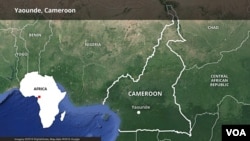At least half a dozen schools in Cameroon's two English-speaking regions have been burned in the past week. It is the latest sign of deepening tensions as the ongoing strike in Cameroon’s two English-speaking regions enters its tenth month.
The strike began in November 2016 with anglophone teachers and lawyers in the northwest and the southeast. They said English-speaking citizens are marginalized in the bilingual country and demanded reforms. But secessionist groups soon joined the movement, and their calls for full independence for the English-speaking zones derailed dialogue and helped spur a government crackdown.
Continued arson attacks in Cameroon's English-speaking northwest have prompted calls for the creation of self-defense militia.
Some parents in Bamenda said it is no longer safe after their children's school, the Baptist Comprehensive High School, was set ablaze August 13.
The burnings have continued.
Residents say schools are being targeted for failing to respect the call to strike until all anglophone activists are released from detention. Messages circulating on social media this month have called for businesses to close three out of every five working days.
Wilfred Ndong, the government official in charge of basic education for the northwest, said law enforcement agencies cannot be present in every school.
"We have advised them to form vigilante groups in the schools so that they can help to secure the places for us," he said. "And in places where they can afford, let them light up the places.Some of these things happen because of the dark nature of the environments concerned."
Markets and government buildings have also been targeted this year in the northwest and southwest.No one has claimed responsibility. The government has condemned the vandalism and blamed it on militant separatist groups.
Weapons cache
Cameroon government spokesperson Issa Tchiroma told VOA police discovered a cache of weapons and a bomb-making factory in the northwestern town of Mbengwi earlier this month. He said seven people were arrested, including a Cameroonian-born Belgian national who had smuggled his way into the country through Nigeria.
"He admitted being a member of the Ambazonia and the main leader of the armed wing of the Liberation Movement of Southern Cameroon," he said.
Ambazonia is a name proposed by separatist activists for the nation they would create.
At least 60 people arrested in connection with the strike have appeared before a military court in the capital to answer charges of attempting to destabilize the country and cause revolt.
A black and white video released online in early August, which shows 12 purported strike detainees in what appears to be a dark, underground prison has further raised tensions.
The government has declined to comment on the video, but the footage has been shared widely on social media in Cameroon. In it, the speakers compare their conditions of detention to "concentration camps," and say they will gladly die if need be for the cause of independence for the two anglophone regions.
Cameroon is officially a bilingual country, with anglophones comprising about 20 percent of the country's 23 million inhabitants.
Violent strike-related unrest in December, coupled with emerging separatist rhetoric, prompted a government crackdown. Strike leaders then broke off dialogue with the government to resolve the crisis until all those arrested are released.
A former lawmaker from the northwest region, Paulinus Jua, said dialogue is needed.
"If government were doing a lot, things would have subsided," he said. "But you see that this thing is instead especially in anglophone Cameroon getting more radicalized. Something can be done. Dialogue, genuine dialogue, comprehensive genuine dialogue. That is what we have been complaining about in this country for so long."
President Paul Biya has announced some reforms in response to the strike, like a new common law section of the Supreme Court, but has said he will not engage in dialogue that threatens national unity.




